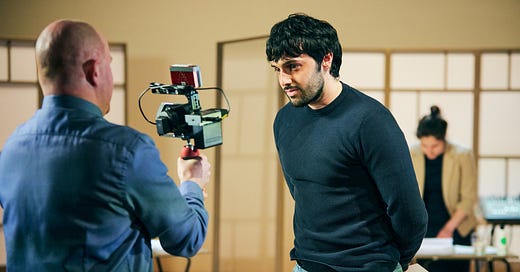Lobsters review: Sly contemporary theatre gets soppy
In Nyree Yergainharsian's new play, a troubled broadcast about finding lifelong commitment goes places both surprising and disappointing.
★ ★
At the touch of love, we all know, everybody becomes a poet. Nyree Yergainharsian’s new streamed play Lobsters seems to take Plato’s adage as its conceit. Who better to rhapsodise about the search for lifelong commitment than people on-the-ground?
Composed from real-life testimonies, this play takes off from a fearlessly absurd place. Yergainharsian, joined by Brian Bennett and Peter Newington, are the nervous, smiling presenters of a broadcast where they read out accounts of whirlwind romances and lessons learnt from bad dates. Clinging to scripts, and moving carefully between marked positions, everything down to the necessary spritzes of hand sanitiser seem such a pre-calculation that an ad lib could upset proceedings. “One thing I’ve learned is that often in moments of struggle is when real connection happens,” says Newington in an improvisation, much to the horror of his co-hosts.
Of course, this line isn’t an outlier. Yergainharsian and Bennett have a track record in plays full of meticulously clever detail. At the beginning of the last decade, as part of The Company Theatre Co, they made joyfully dashing contemporary theatre that had more in common with playful outfits on the continent than with the hard-hitting agitprop of their domestic peers. As the play’s broadcast experiences technical difficulties and is eventually plundered into darkness, it, much like the deceptively beige details of Eugenia Genunchi’s set, begins to find more meaningful displays from new camera angles.
Bennett is superb as a guileless presenter eternally making mistakes, but in the blacked-out studio his bright comedy retreats into more solemn shades - silence, insecurity, fear – as he contemplates if his audience is still watching. “It only takes one person to be real,” says Newington, with encouraging wisdom. In the scramble to continue the production, apologies to the audience sound torn from more personal dramas. “I never thought it would end up like this,” says Yergainharsian, sad and exasperated.
In the dark, Yergainharsian’s production, co-directed by Jocelyn Clarke, moves somewhere surprisingly real. Testimonies previously delivered with dead smiles not only begin to flow effortlessly but with subversion. As Newington and Bennett are allowed to relax into the enjoyment of good company, trading stories about bad dates and the illusions of online dating, you can’t help but notice the welcome arrival of good conversation and tasteful ambience. What more do you need?
The emotional purge known as catharsis might be more often associated with conventional drama, as if contemporary theatre’s emphasis on artificiality means that it is soulless. Instead, to move beyond those boundaries of feeling enforced by classic theatre is to find poignancy in mysterious places. Yergainharsian’s decision, then, to jump from the poetic scenes in the strange studio to documentary-like footage showing the original testimonies being spoken by their owners feels like a disappointing step backward.
Occasionally during these recordings, the camera seems to glitch intentionally, as if to appear unembellished - the assured realism of cinéma vérité. A final shot provides an even bigger glimpse into behind-the-scenes, showing that it takes a village to make a play.
There’s no need to pile on the soppiness. This sly contemporary play had way better methods to move us.




